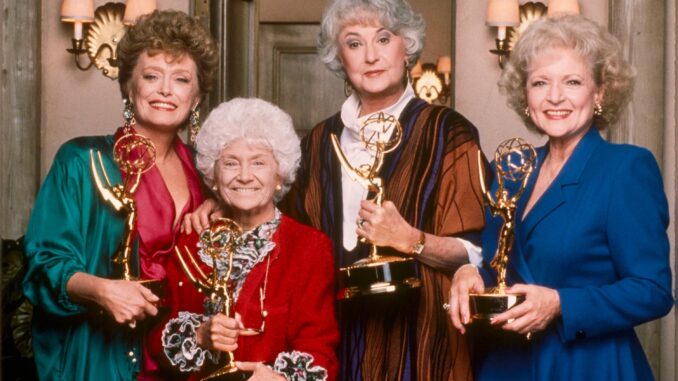
In 2005, EW toasted the 20th anniversary of the premiere of this beloved series by collecting the reminiscences of the talented people who brought it to life.
As we remember Beatrice Arthur, who died on April 25 at age 86, we bring it back in tribute
It’s a widely accepted television dictum: Old people are neither trendy nor sexy, and young viewers don’t want to watch shows about them. But 20 years ago, on Sept. 14, 1985, NBC went against the industry’s ageist grain and unleashed four of the sassiest seniors in TV history. The Golden Girls — the brainchild of Soap creative team Susan Harris, Tony Thomas, and Paul Junger Witt — was a risk for the then-resurgent NBC. Television comedy was just emerging from a creative drought (sound familiar?) and NBC was asking an all-female cast (another dicey idea) to lure fans to Saturday night (yikes!), where viewership had flagged since the ’70s glory days of CBS’ All in the Family, The Mary Tyler Moore Show, and The Bob Newhart Show. ”Girls was the last show to bring viewers back to Saturdays,” says The WB’s Garth Ancier, who served as NBC’s vice president of current comedy development from 1982 to 1986. ”It broke a lot of rules.”
Over 180 episodes, The Golden Girls followed four well-dressed women living together — and sharing lots of cheesecake — in a Miami home with a spacious lanai. They were led by imposing substitute teacher Dorothy Zbornak (Bea Arthur), who maintained an arsenal of withering put-downs and killer glares. Homeowner Blanche Devereaux (Rue McClanahan) was an oversexed Southern belle who refused to acknowledge her age. Betty White played Rose Nylund, a dense Pollyanna who told rambling stories about her Minnesota hometown, St. Olaf. And Dorothy’s diminutive Sicilian mother, Sophia (Estelle Getty), was a former resident of Shady Pines nursing home who, because of a stroke that had destroyed the tact region of her brain, spouted riotously blunt one-liners.
The show premiered at No. 1 — a rare achievement — with an estimated 44 million viewers, and it resided in the top 10 for six consecutive seasons. The 10-time Emmy winner has been spoofed on Saturday Night Live and at the MTV Movie Awards, referenced on The O.C., and singled out as Sex and the City‘s progenitor. Its writing staff was also something of a comedy farm team: Marc Cherry now heads Desperate Housewives.
”Golden Girls is the model for any female ensemble show,” he says. ”You can trace Gabrielle right back to Blanche. She’s very selfish, but you still like her because she’s cute and funny.” Longtime Girls staffer Mitch Hurwitz, meanwhile, created Fox’s Emmy winner Arrested Development. ”It completely informs what we do here,” says Hurwitz. ”The name of the rehab center that Lucille Bluth went into was called Shady Pines as a little homage.” Adds Warren Littlefield, who was NBC’s senior vice president of comedy development when Girls premiered: ”There is nothing trendy about this show. There are no tricks. It’s a classic. I love going back to it.”
So do we — especially now, when broadcast networks have all but abandoned Saturday-night programming. In honor of The Golden Girls‘ 20th anniversary, we asked the actors (except for the now-retired Getty, 82, who is ill) and the creative team behind one of television’s most enduring hits to share their memories.

I. A SENIOR MOMENT
On an August weekend at NBC’s Burbank studios in 1984, the network’s stars were filming what Littlefield calls ”some bulls— special” to tout the coming fall slate. In a skit promoting Miami Vice, Remington Steele secretary Doris Roberts sparred with 63-year-old Night Court bailiff Selma Diamond, who kept mistaking the title for Miami Nice. The execs in the audience were amused, and they wondered if there was a series in the geriatric humor unfolding before them. Soon after, Paul Junger Witt and Tony Thomas were in Littlefield’s office pitching a show about a female lawyer. He nixed the idea, but then asked if Witt’s wife, Susan Harris, would be interested in fleshing out Miami Nice as a pilot instead.
HARRIS: Paul came home and said, ”There’s this idea, but you’re not going to want to do it.” And I said, ”That’s right. I don’t want to do anything. But what is it?” He got me when he said the words old women. It was a demographic that had never been addressed.
Harris went to work on the pilot script, which called for Dorothy to be played by a ”Bea Arthur type” and included a fifth character, Coco, a gay male housekeeper. When he got the script, Littlefield says he was ”running all over the house grabbing anybody who would listen. I kept reading scenes to them and saying ‘God, this is brilliant!”’ He greenlit the pilot, and Cosby Show director Jay Sandrich — who’d helmed Soap for much of its run — agreed to direct the episode. Casting calls began.
MCCLANAHAN: Before I started reading it, I said
”Ohhh, this is a winner.” I called my agent and said I was perfect for the role of Blanche, to which she said, ”They want you to read for Rose. They want Betty White for the role of Blanche.”
WHITE: It was the best script that I’d read, maybe, in life. You get so many bad scripts sent your way in this business, so many dogs. And I shouldn’t use that term because I love dogs.
